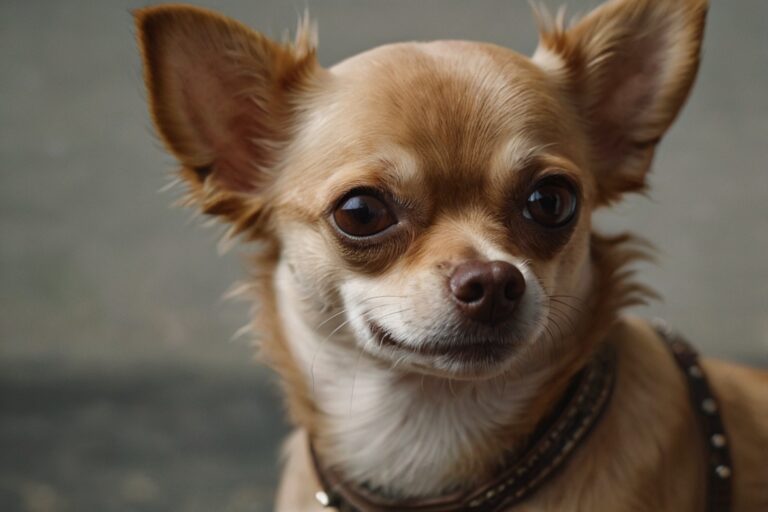How many puppies does a Chihuahua typically have?

Chihuahuas are one of the smallest dog breeds, and this influences the size of their litters. Unlike larger dogs, Chihuahuas generally have small litters, with several factors affecting how many puppies they deliver. Understanding these factors and knowing the typical range of litter sizes can help prospective Chihuahua breeders prepare for the birthing process and ensure optimal care for both mother and puppies.
1. Factors Influencing Litter Size in Chihuahuas
Several factors can impact the litter size in Chihuahuas, from the mother’s age to her genetic background. Recognizing these influences helps in anticipating litter size and making the right preparations for each pregnancy.
1.1 Age of the Mother
The age of a Chihuahua mother plays a significant role in determining litter size. Younger Chihuahuas, particularly those experiencing their first pregnancy, may have smaller litters, typically consisting of only one or two puppies. As they reach prime reproductive age, generally between two and five years, their litter sizes often increase, as their bodies are fully developed to support multiple puppies. However, as Chihuahuas approach the later stages of their reproductive years, litter sizes may decrease again, as older mothers tend to carry fewer puppies per pregnancy due to reduced fertility.
1.2 Health and Nutrition
The health and nutritional status of the Chihuahua mother is another essential factor affecting litter size. A mother in optimal health, with a diet rich in essential nutrients, is better equipped to support a larger litter, as her body has the resources needed for fetal development. Ensuring a balanced diet with adequate protein, vitamins, and minerals before and during pregnancy helps maintain her energy levels and strengthens her body’s ability to carry multiple puppies. Conversely, Chihuahuas with nutrient deficiencies or health issues may have smaller litters, as their bodies prioritize the health of fewer puppies. Regular veterinary checkups and a carefully planned diet can support larger and healthier litters.
1.3 Breeding History
A Chihuahua’s breeding history also impacts litter size, as previous pregnancies can influence future reproductive success. First-time Chihuahua mothers often have smaller litters, which is common across many breeds. However, mothers who have gone through previous pregnancies successfully may have larger litters in subsequent pregnancies, as their bodies have adapted to the reproductive process. Breeding history also affects the Chihuahua’s overall health and reproductive cycle, with frequent breeding potentially reducing litter sizes over time if the mother does not have adequate recovery periods between pregnancies.
1.4 Genetics and Lineage
Genetics and lineage play a significant role in determining a Chihuahua’s litter size potential. Chihuahuas from lines that typically produce smaller litters may inherit this trait, resulting in fewer puppies per pregnancy. Conversely, if the mother and father come from lines known for slightly larger litters, the likelihood of a larger litter size may increase. Selective breeding practices often consider the litter size trends in a Chihuahua’s lineage, as these genetic predispositions influence reproductive success. Understanding the genetic background of both parents provides insight into expected litter sizes, allowing for better preparation.
| Factor | Influence on Litter Size | Notes |
|---|---|---|
| Age of Mother | Prime age (2-5 years) may increase litter size | Older/younger mothers often have smaller litters |
| Health and Nutrition | Better health and diet may support larger litters | Balanced diet essential for fetal development |
| Breeding History | First litters smaller; later litters may grow | Recovery time needed for optimal reproductive health |
| Genetics and Lineage | Genetic tendencies toward litter size | Breeding from larger litter lines may increase count |
2. Average Litter Size for Chihuahuas

The typical litter size for Chihuahuas is smaller than many other breeds, largely due to their small physical stature. However, within this smaller range, there are still variations depending on the type of Chihuahua, maternal experience, and the mother’s size and weight.
2.1 Standard Litter Size Range
The average litter size for Chihuahuas generally ranges from one to three puppies per pregnancy. This range is smaller than that of larger breeds, as the Chihuahua’s body has limited space to carry multiple puppies safely. Factors such as the mother’s health, age, and genetics can all impact whether a Chihuahua will deliver at the higher or lower end of this range. In rare cases, a Chihuahua may give birth to four puppies, but larger litters are unusual and can carry higher risks for both the mother and the puppies. Proper preparation and veterinary support are essential, particularly for litters of three or more.
2.2 Comparing Apple Head and Deer Head Chihuahuas
Apple Head and Deer Head Chihuahuas, the two main types within the breed, may experience slight differences in litter size. Apple Head Chihuahuas, characterized by their rounder heads and shorter snouts, are slightly more likely to have smaller litters due to their compact body structure. Deer Head Chihuahuas, with their slightly larger frame, may occasionally carry an additional puppy in their litters. However, this difference is subtle, and both types still fall within the standard one-to-three-puppy range. Knowing the type of Chihuahua can offer a general expectation but does not significantly alter the average litter size.
2.3 First-Time Mothers vs. Experienced Mothers
First-time Chihuahua mothers often have smaller litters, typically consisting of only one or two puppies, as their bodies are still adjusting to the demands of pregnancy. As they gain experience and go through subsequent pregnancies, many Chihuahuas experience an increase in litter size, reaching the upper end of the average range of one to three puppies. Experienced mothers may also face fewer complications due to their familiarity with the birthing process, though regular veterinary support remains crucial to ensure safe pregnancies and deliveries.
2.4 Impact of Size and Weight on Litter Size
The size and weight of a Chihuahua mother can also affect her typical litter size. Larger Chihuahuas within the breed’s range, which may weigh closer to six pounds, often have slightly larger litters than their smaller counterparts, as their bodies have more space and resources to support additional puppies. Smaller Chihuahuas, particularly those on the lower end of the breed’s weight spectrum, may be limited to one or two puppies due to physical constraints. Monitoring a Chihuahua’s size and ensuring she is within a healthy weight range before breeding can help set expectations for litter size and reduce risks during pregnancy.
These factors provide a comprehensive look at the typical litter size for Chihuahuas and the considerations that influence it. Understanding these aspects allows for better preparation and support during a Chihuahua’s pregnancy, ensuring a safe and healthy experience for both mother and puppies.
3. Caring for a Pregnant Chihuahua and Her Litter

Caring for a pregnant Chihuahua requires close attention to her health, diet, and environment to ensure a safe pregnancy and delivery. Providing proper prenatal care and managing her recovery post-birth can help support both the mother and her puppies, promoting healthy development and a smoother weaning process.
3.1 Prenatal Care for Healthy Litter Sizes
Prenatal care is essential for promoting healthy fetal development in pregnant Chihuahuas. Regular veterinary visits allow for close monitoring of her health and the puppies’ growth, detecting any potential complications early on. A balanced, nutrient-rich diet tailored to her specific needs provides her with the energy and nutrients required to support a healthy pregnancy. Supplements, such as calcium and omega-3 fatty acids, are often recommended to aid fetal development and strengthen her immune system. Ensuring she has a calm, stress-free environment is also important, as stress can negatively affect her health and the development of her litter.
3.2 Monitoring Health During Pregnancy
Regularly monitoring the Chihuahua’s health during pregnancy can help identify any signs of complications that may affect litter size or the mother’s well-being. Observing her energy levels, appetite, and behavior can provide insight into how her pregnancy is progressing. Signs like excessive fatigue, loss of appetite, or unusual discomfort may indicate the need for a veterinary checkup. Early intervention can help prevent issues such as preterm labor or other complications, ensuring that both the mother and her puppies remain healthy throughout the pregnancy. Keeping her active with gentle exercise also promotes circulation and reduces stress, which can benefit her and her developing puppies.
3.3 Supporting the Mother After Birth
After delivery, the mother Chihuahua requires ample support to recover and care for her puppies. Providing her with nutrient-dense food and access to clean water helps restore her energy and supports lactation, allowing her to nourish her puppies effectively. A warm, comfortable space encourages relaxation and gives her a safe environment to bond with her puppies. Keeping her environment calm and free from disturbances reduces stress and promotes a healthy mother-puppy bond. Monitoring her health closely in the days following delivery is essential to detect any post-birth complications, such as infection or mastitis, ensuring she receives prompt care if needed.
3.4 Weaning and Managing Small Litters
Weaning is a gradual process that begins when puppies are about four weeks old and involves introducing them to solid food. For smaller litters, puppies may stay with their mother slightly longer as they transition to eating independently. Offering a moist, high-quality puppy food supports their nutritional needs during weaning, while observing them closely helps ensure each puppy is adjusting well. The mother may naturally start distancing herself as the puppies grow, encouraging them to eat solid food. Ensuring the puppies receive adequate nutrients during weaning promotes a smooth transition and supports their growth into healthy, independent young dogs.
FAQ
Q1: How many puppies can I expect from a first-time Chihuahua mother?
First-time Chihuahua mothers generally have smaller litters, usually with only one or two puppies. With subsequent pregnancies, litter sizes may increase slightly as the mother’s body adapts to the reproductive process.
Q2: Does a Chihuahua’s size affect how many puppies she can have?
Yes, a Chihuahua’s size and weight can influence litter size. Larger Chihuahuas within the breed range may carry more puppies, while smaller Chihuahuas often have fewer, typically one or two, due to physical space limitations.
Q3: How can I support my Chihuahua during pregnancy?
Providing a nutrient-rich diet, regular veterinary checkups, and a calm environment supports a healthy pregnancy. Supplements recommended by a vet can also help with fetal development, promoting healthier, more stable litters.






